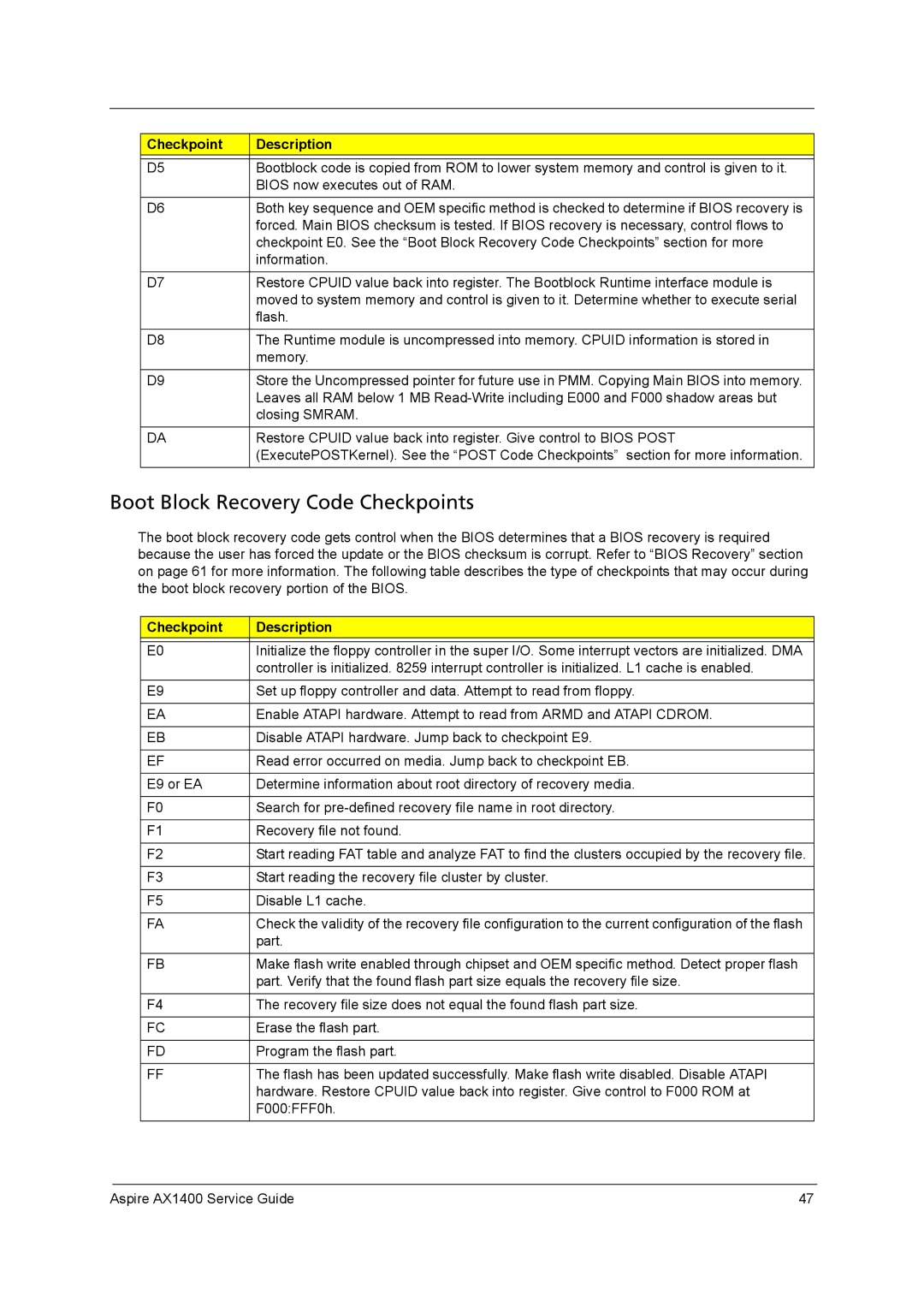
Checkpoint | Description |
|
|
D5 | Bootblock code is copied from ROM to lower system memory and control is given to it. |
| BIOS now executes out of RAM. |
|
|
D6 | Both key sequence and OEM specific method is checked to determine if BIOS recovery is |
| forced. Main BIOS checksum is tested. If BIOS recovery is necessary, control flows to |
| checkpoint E0. See the “Boot Block Recovery Code Checkpoints” section for more |
| information. |
|
|
D7 | Restore CPUID value back into register. The Bootblock Runtime interface module is |
| moved to system memory and control is given to it. Determine whether to execute serial |
| flash. |
|
|
D8 | The Runtime module is uncompressed into memory. CPUID information is stored in |
| memory. |
|
|
D9 | Store the Uncompressed pointer for future use in PMM. Copying Main BIOS into memory. |
| Leaves all RAM below 1 MB |
| closing SMRAM. |
|
|
DA | Restore CPUID value back into register. Give control to BIOS POST |
| (ExecutePOSTKernel). See the “POST Code Checkpoints” section for more information. |
|
|
Boot Block Recovery Code Checkpoints
The boot block recovery code gets control when the BIOS determines that a BIOS recovery is required because the user has forced the update or the BIOS checksum is corrupt. Refer to “BIOS Recovery” section on page 61 for more information. The following table describes the type of checkpoints that may occur during the boot block recovery portion of the BIOS.
Checkpoint | Description |
|
|
E0 | Initialize the floppy controller in the super I/O. Some interrupt vectors are initialized. DMA |
| controller is initialized. 8259 interrupt controller is initialized. L1 cache is enabled. |
|
|
E9 | Set up floppy controller and data. Attempt to read from floppy. |
|
|
EA | Enable ATAPI hardware. Attempt to read from ARMD and ATAPI CDROM. |
|
|
EB | Disable ATAPI hardware. Jump back to checkpoint E9. |
|
|
EF | Read error occurred on media. Jump back to checkpoint EB. |
|
|
E9 or EA | Determine information about root directory of recovery media. |
|
|
F0 | Search for |
|
|
F1 | Recovery file not found. |
|
|
F2 | Start reading FAT table and analyze FAT to find the clusters occupied by the recovery file. |
|
|
F3 | Start reading the recovery file cluster by cluster. |
|
|
F5 | Disable L1 cache. |
|
|
FA | Check the validity of the recovery file configuration to the current configuration of the flash |
| part. |
|
|
FB | Make flash write enabled through chipset and OEM specific method. Detect proper flash |
| part. Verify that the found flash part size equals the recovery file size. |
|
|
F4 | The recovery file size does not equal the found flash part size. |
|
|
FC | Erase the flash part. |
|
|
FD | Program the flash part. |
|
|
FF | The flash has been updated successfully. Make flash write disabled. Disable ATAPI |
| hardware. Restore CPUID value back into register. Give control to F000 ROM at |
| F000:FFF0h. |
|
|
Aspire AX1400 Service Guide | 47 |
